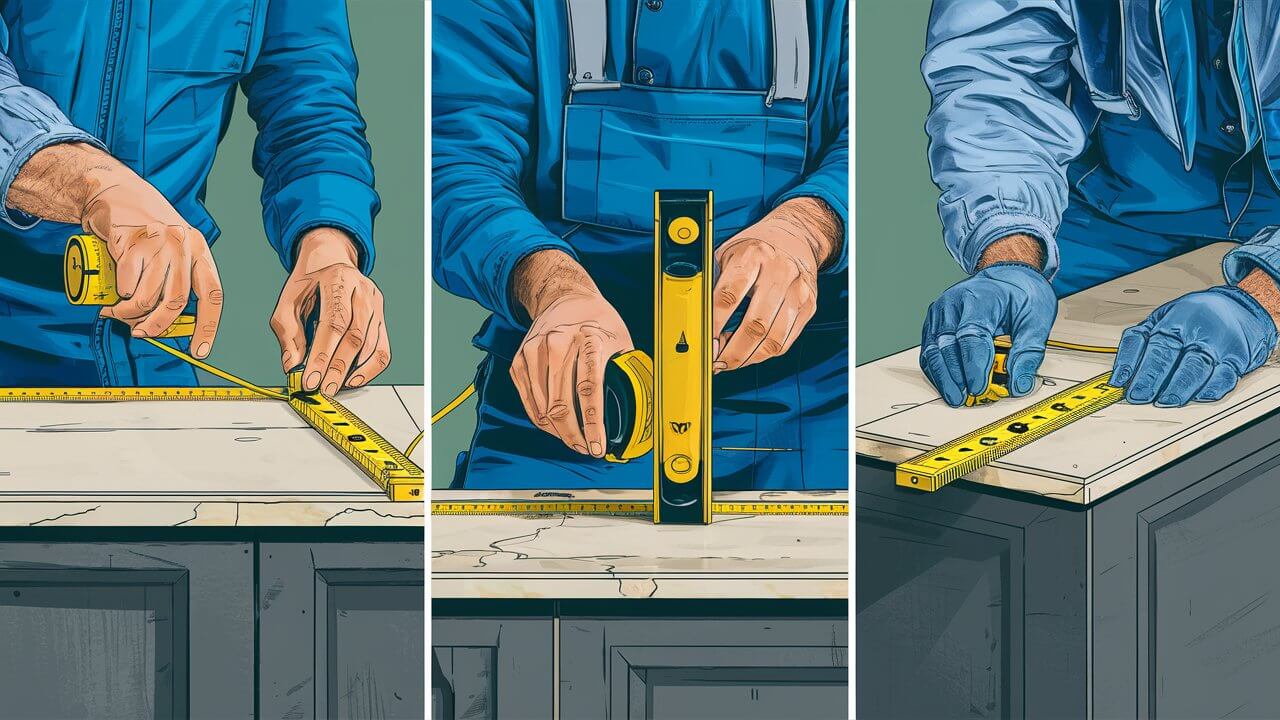How to Measure Countertops – Granite & Quartz
Okay people, let’s get into the sometimes confusing but always important world of countertop measurement. Whether you’re thinking of a granite upgrade or just wondering what your kitchen’s square footage is, measurements are the foundation of a successful project.
How to Measure Countertops: Tools of the Trade
Before we get started (literally), let’s get the details so we can get an accurate estimate for your countertops. Here are our tools:
- Measuring tape (the longer the better)
- Graph paper (optional but oh so helpful)
- Pencil
- Level (so those counters sit level)
Using a tape measure will help you measure the square footage needed for your new countertops.
Measurement Steps: How to Measure Countertops
- Sketch It Out: Grab your graph paper or a blank sheet and draw a rough layout of your countertop. Include any appliances (sink, cooktop), backsplashes and those cute little corners.
- Divide and Conquer: Break your countertop into smaller rectangles or squares. This makes it less overwhelming and way more accurate.
- Measure Twice: Measure the length and width of each section to measure countertops accurately, note the measurements on your sketch. Double check those numbers – trust me, it’s worth it.
- Calculate the Area: For each section, multiply the length by the width. This gives you the area in square inches. If you want to get fancy, convert it to square feet by dividing by 144. To get the final square footage, divide the total square inches by 144 and round up the result.
- Add It Up: Add up the areas of all your sections to get the total countertop area. Knowing the total square footage is key to getting an accurate estimate. Ta-da! You’re a countertop measurement master.
Countertop Troubleshooting: Tips & Tricks for Kitchen Countertops
- Awkward Shapes: If you have a curved or irregularly shaped countertop, don’t freak out! Break it down into smaller, measurable sections and estimate the shapes as best you can. Accurate measurements of existing countertops are key to a perfect fit.
- Backsplashes: Don’t forget to measure those backsplashes! They’re often overlooked but count towards your material needs. Also, consider the extra processing for exposed edges as this will impact the overall cost of your countertops.
- Overhang: Add a little extra to your measurements for the overhang (usually 1.5 inches). This will protect your drawers and cabinets from spills and crumbs.
Why Accurate Measurement Matters (Beyond Avoiding Awkward Silences) 🤔
Accurate measurements aren’t just for show at your next backyard BBQ. They’re important for:
- Material Estimates: Knowing your countertop area helps you order the right amount of material so you don’t end up with too much or not enough.
- Budgeting: Accurate measurements mean accurate quotes so you can plan your budget.
- Installation: Proper measurements means a smooth installation process with no surprises or delays.
Pro Tip: Always round up your measurements when ordering materials. Better to have a little extra than to be scrambling for more at the last minute. Empower Your Inner DIYer
Measuring your countertops may seem like a small task but it’s a big deal for taking control of your home projects. It’s about more than just numbers; it’s about the feeling of a job well done and the happiness of creating a space that’s yours.
| Countertop Material | Standard Thickness | Notes |
|---|---|---|
| Granite | 1.25 inches | Durable, heat-resistant, and comes in a variety of colors and patterns. |
| Quartz | 1.25 inches | Engineered stone, non-porous, stain-resistant, and requires minimal maintenance. |
| Marble | 1.25 inches | Luxurious, natural stone with unique veining patterns. Requires more care and sealing due to its porosity. |
| Butcher Block | 1.5 inches | Warm, natural wood surface that adds a rustic touch to kitchens. Requires regular oiling and maintenance. |
| Concrete | 1.5-2 inches | Customizable, modern, and durable. Can be stained or polished for a variety of looks. |
| Laminate | 1 inch | Affordable, comes in a wide range of colors and patterns, and easy to clean. Less durable than natural stone or engineered materials. |
| Solid Surface | 0.5 inch | Seamless, non-porous, and available in a variety of colors and patterns. Can be repaired if scratched or damaged. |
| Tile | Varies | Affordable and customizable with a wide variety of colors, patterns, and materials. Grout lines require regular cleaning and sealing. |
FAQ – Your Countertop Questions, Answered
- Should I include the sink and cooktop cutouts in my measurements? Yes! Even though they’ll be cut out, the material is still needed for the fabrication process.
- Do I need to hire a professional to measure my countertops? While it’s an option, measuring your countertops yourself can be a fun DIY project. Just make sure to follow the steps and double check your work.
- What if my countertop has multiple levels or tiers? Measure each level or tier separately and then add them together for the total area.




